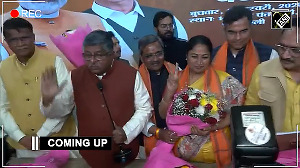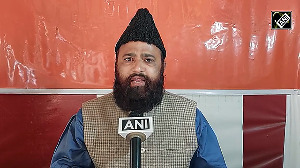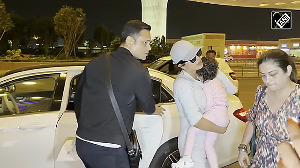The FBI moved against Headley seriously only after coming to know of his role in the planned attack in Copenhagen. It did not show the same seriousness in respect of his role in the Mumbai attack, writes B Raman
The latest round of disclosures relating to David Coleman Headley, which have embarrassed the Federal Bureau of Investigation, were brought out in two detailed investigative reports by Sebastian Rotella of ProPublica, a website which specialises in investigative reporting.
These two reports -- titled FBI Was Warned Years in Advance of Mumbai Attacker's Terror Ties and Feds Confirm Mumbai Plotter Trained With Terrorists While Working for DEA -- which were published on the web site, have also been used by the Washington Post, thereby adding to their credibility.
A large part of these reports are based on a study of the court documents filed by the prosecution against Headley. The remaining is fresh information gathered from Headley's ex-wives and serving and retired officials of the FBI and other agencies.
The salient points in the investigative reports are:
In three interviews with federal agents, Headley's wife said he was an active member of the Lashkar-e-Tayiba, had trained extensively in its Pakistani camps, and had shopped for night vision goggles and other equipment, according to officials. The wife also told agents that Headley had bragged about working as a paid US informant while he trained with the terrorists in Pakistan.
The FBI "looked into" the tip, but they declined to say what, if any, action was taken. Headley was jailed briefly in New York on charges of domestic assault, but was not prosecuted. He wasn't captured until 11 months after the Mumbai attack, when British intelligence alerted American authorities that he was in contact with Al Qaeda operatives in Europe.
The New York Times reported that another of Headley's wives -- he apparently was married to three women at the same time -- had also warned US officials about his terror links. In December 2007, the Moroccan woman met with officials at the US embassy in Pakistan and told them about Headley's friendship with Lashkar members, his hatred of India and her trips with him to the Taj Mahal Hotel, a prime target of the Mumbai attacks. On Saturday, federal officials said the women's tips lacked specificity. "US authorities took seriously what Headley's former wives said. Their information was of a general nature and did not suggest any particular terrorist plot," a senior administration official said.
Headley's relationship with the US government is especially delicate because the investigation has shown that he also had contact with suspected Pakistani intelligence officials and a Pakistani militant named Ilyas Kashmiri, who has emerged as a top operational leader of the Al Qaeda.
The following conclusions emerge from the two reports:
Headley was initially an informant for the Drug Enforcement Agency. He was being used to collect intelligence about the activities of the LeT in Pakistan. For this purpose, he used to visit Pakistan.
In August 2005, his US-based ex-wife had alerted an FBI task force about Headley's links with the LeT and helping them procure equipment like night-vision glasses. She had also told the FBI about his e-mail and other contacts in Pakistan. She had also complained that he was ill-treating her. The FBI questioned him about her allegations of ill-treatment, but did not seriously follow up her tips about his ties with the Lashkar.
The FBI probably did not question him about his links with the Lashkar because it was already aware of the details since he was a DEA informant. In December 2007, his Moroccan ex-wife complained to the US embassy in Islamabad about his links with the LeT. It is not clear what action the embassy took on her complaint
In 2008, the FBI came to know about the Lashkar's plans to launch a sea-borne terrorist strike on certain targets on the Mumbai sea-front, including the Taj Mahal Hotel. It promptly passed on the information to the Indian agencies. The FBI could not have been expected to tell the Indian agencies that the information came from Headley. This was a specific piece of information complete in many respects except the date of the planned attacks. No intelligence or investigation agency would reveal the name of a source giving such specific information.
Headley had visited India five times to collect operational intelligence and to help the Lashkar select targets and the landing point for the boat. Before starting his visits to India, Headley had taken a new passport under the name of David Coleman Headley in place of his previous passport under the name Daood Gilani in order to conceal his Pakistani origin from the Indian consular and immigration authorities. The FBI would have been expected to share this information with the Indian authorities, but it did not do so. Had the FBI done so, the Indian authorities might have been able to establish the details of his Indian network, arrest and question him and pre-empt the attack.
The FBI did not alert the Indian authorities, even when Headley visited India again after the 26/11 terrorist strikes.
The FBI seems to have arrested Headley only after it intercepted messages about his being used by the LeT and Ilyas Kashmiri of the 313 Brigade to plan a terrorist strike in Copenhagen against a newspaper which had published cartoons of Prophet Mohammed in 2005. The arrest was made actually after British intelligence came to know of his contacts with some associates of Kashmiri in Europe, while planning the Copenhagen attack. The FBI moved against him seriously only after coming to know of his role in the planned attack in Copenhagen. It did not show the same seriousness in respect of his role in the Mumbai attack.
How helpful was the FBI in helping the Indian agencies in this case? It would be difficult to answer this question unless one knows the following details:
- When did the FBI first take the initiative in informing the Indian agencies about Headley's arrest and the information obtained from him?
- Why did the FBI delay its response to the Indian request for permission to interrogate him?
- Why did the FBI insist on Headley being interrogated in US custody in the presence of FBI officers and did not allow Indian officers to question him independently?
During the visit of Prime Minister Manmohan Singh to Washington, DC, in November 2009 for talks with President Barack Obama, the two countries had reached what was described as a joint counter-terrorism initiative to promote counter-terrorism co-operation between the agencies of the two countries. The FBI's suspicious conduct, in keeping the Indian agencies in the dark about all relevant aspects of Headley's involvement with the LeT, adds to the suspicions that the JCTI was an eye-wash sold to India to cover up the FBI's sins of commission and omission and to conceal from the American families whose members were killed in the 26/11 attack, the extent of the FBI's knowledge which could have been used to prevent the strikes.
While this issue may not have any major impact on President Obama's visit to India next month, it will definitely add to the traditional distrust nursed by the Indian agencies about their American counterparts.







 © 2025
© 2025